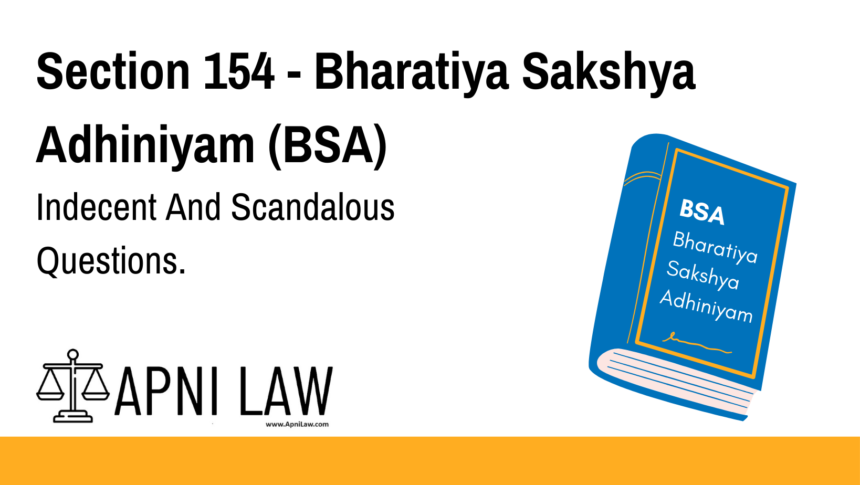Code: Section 154 – Bharatiya Sakshya Adhiniyam (BSA)
The Court may forbid any questions or inquiries which it regards as indecent or
scandalous, although such questions or inquiries may have some bearing on the questions
before the Court, unless they relate to facts in issue, or to matters necessary to be known in
order to determine whether or not the facts in issue existed.
Explanation of Section 154 BSA
Section 154 of the Bharatiya Sakshya Adhiniyam empowers the Court to prevent inappropriate questioning during a trial. Even if a question seems slightly relevant to the case, the Court has the authority to disallow it if it is indecent or scandalous in nature.
This provision ensures that courtroom decorum and the dignity of all individuals involved—especially witnesses and parties—are preserved. The only exception is when such questions directly relate to the facts in issue or are essential for determining the existence of those facts.
In essence, the law balances the right to a thorough cross-examination with the need to maintain respectful and focused legal proceedings.
—
Illustration
Here’s a practical scenario to better understand how Section 154 applies:
Example: During a trial for property dispute, an advocate asks the opposing party personal questions about their past relationships, which have no direct connection to the facts of the case. Although the questions might be loosely framed as relevant to the witness’s credibility, the Court finds them scandalous and stops the line of questioning.
In contrast, if a question—though uncomfortable—directly relates to the fact in issue, such as in a sexual assault case, and is necessary to determine the truth, the Court may allow it.
—
Common Questions and Answers on Section 154 BSA
1. What does “indecent or scandalous” mean under this section?
It refers to questions that are offensive, morally inappropriate, or meant to embarrass, shame, or harass the person being questioned, especially when the question is not directly linked to the case.
2. Can the Court allow indecent questions if they are relevant?
Only if the questions directly relate to the facts in issue or are necessary to determine the existence of such facts. Otherwise, the Court can forbid them.
3. Who decides whether a question is indecent?
The presiding judge has full discretion to decide whether a question is inappropriate. The decision depends on the context of the case and the nature of the question.
4. Is this section applicable to both civil and criminal cases?
Yes. Section 154 applies in any proceeding where a witness is examined and the issue of decency or relevance arises.
5. How does this protect witnesses?
This provision ensures that witnesses are not subjected to irrelevant, personal, or offensive questions that have no bearing on the outcome of the case. It helps foster a respectful environment in court.
—
Conclusion
Section 154 of the Bharatiya Sakshya Adhiniyam plays a crucial role in regulating courtroom questioning. It ensures that cross-examination remains focused, respectful, and limited to questions that are necessary for discovering the truth. By granting the Court the power to forbid inappropriate questions, the law safeguards the dignity of all parties involved and strengthens the fairness of judicial proceedings.
For more easy-to-understand legal guides, visit ApniLaw.








